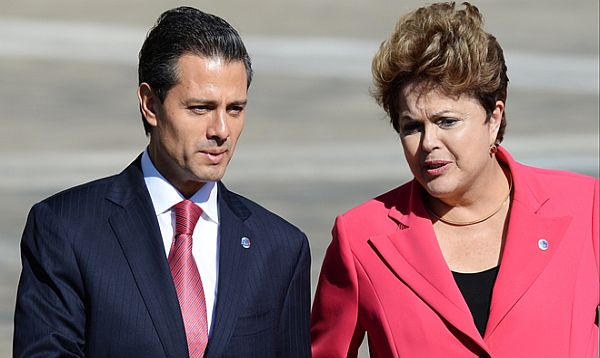As the partial shutdown of the United States government goes on for a second week, its effects are being felt not just at home but across the globe. In Latin America, currencies have swung up and down, while economists and analysts are keeping close watch on the action in Congress for its immediate and long-term impact on the region.
The two largest economies in Latin America, Brazil and Mexico, saw their economies rise and fall respectively in the wake of the US government shutdown and, next up, possibly defaulting due the debt limit impasse. The Mexican peso plummeted to a monthly low because of concerns over demand in the United States for Mexican products, while Brazil’s real currency shot up because of speculation that the shutdown would delay the US Federal Reserve’s stimulus program that injected cheap US cash into emerging markets throughout the world.
Analysts point to the currency fluctuation between the two countries as a point of divergence between Mexico’s reliance on its northern neighbor and Brazil’s burgeoning economic and political independence on the world stage.
"What affects the Brazilian real is more international financial flows, and what impacts the Mexican peso is more economic growth prospects in the US," Jefferson Finch, a Latin America analyst at Eurasia Group said.
The differences between Mexico and Brazil in terms of reliance on the US dollar are well known and play into the greater political overview that has been churning since allegations arose of US National Security Agency spying in both countries.
While Mexican President Enrique Peña Nieto was angered by the spying revelations and demanded an apology, there was very little political fallout from the crisis. US Vice President Joe Biden recently met with Peña Nieto to launch the "High Level Economic Dialogue" to boost trade and investment ties.
"The US-Mexico relationship is too deep, multifaceted, and important for both countries for this to really rattle relations," Shannon O’Neil, a senior fellow for Latin America Studies at the Council of Foreign Relations, said in September.
The boost to Brazil’s real comes amid strained relations between the US and the South American superpower over the controversial NSA revelations.
A much-hyped state visit by Brazilian President Dilma Rousseff has been cancelled because of the allegations, and the Obama administration has been in damage control mode over the affair. Obama personally called Rousseff to ask her to reconsider - to no avail.
"Meddling in such a manner in the lives and affairs of countries is a breach of international law," Rousseff told the United Nations last month.
Another adverse effect for the US in the budget battle is the speculation more and more tourists will forgo visits to the country in favor of Latin America. Currently, all of the US national parks hare closed and national monuments such as the Washington memorial and the Smithsonian museums have shuttered their doors during the shutdown.
The shutdown could cause "serious and immediate harm" to the travel industry, the US travel associated announced last week with some agencies sending their clients to Latin American destinations instead of the US.
In markets in the rest of the world, the mood in financial markets is cautious this week as US politicians remained at loggerheads over how to solve a budget crisis that has raised fears of a possible US debt default.
The prevailing view is that Congress and the White House will solve their standoff over the budget that has seen the partial shutdown of the government drag on, as well as the potentially more important issue of raising the debt ceiling. Asian stocks managed to eke out gains earlier, while the dollar clambered off recent lows against the yen.
In particular, investors want to see progress on the debt ceiling, which the Treasury Department has said has to be raised by October 17th. If it's not, the world's largest economy faces the possibility of defaulting on its debts, a move that would send shockwaves around global markets.
"Although most investors believe that a deal will be reached by the deadline, investors are still concerned with the impact their portfolios are likely to take in the meantime," said Shavaz Dhalla, a financial trader at Spreadex.
Original Story


